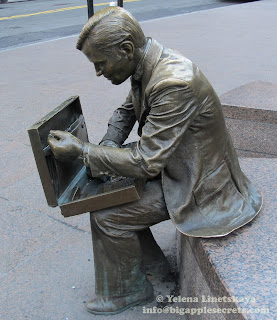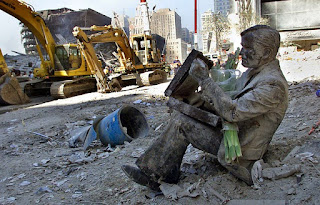 Double Check is the life-size bronze of a businessman sitting on a bench as he sifts through his briefcase, seeming to make final preparations for an upcoming business meeting in a nearby office building. The sculpture was made in 1982 by John Seward Johnson II, an American artist known for his trompe l’oeil painted bronze statues. Johnson founded in 1992 Grounds For Sculpture, a park in New Jersey to display work completed at the Johnson Atelier and other outdoor exhibitions.
Double Check is the life-size bronze of a businessman sitting on a bench as he sifts through his briefcase, seeming to make final preparations for an upcoming business meeting in a nearby office building. The sculpture was made in 1982 by John Seward Johnson II, an American artist known for his trompe l’oeil painted bronze statues. Johnson founded in 1992 Grounds For Sculpture, a park in New Jersey to display work completed at the Johnson Atelier and other outdoor exhibitions.Shortly after Double Check was completed, the work was installed in Liberty Plaza Park, now Zuccotti Park , in lower Manhattan. The park was created in 1968 by Pittsburgh-based United States Steel and named Liberty Plaza Park because it was situated beside One Liberty Plaza building. The park was one of the few open spaces with tables and seats in the Financial District, its northwest corner is across the street from Four World Trade Center.
Double Check became a fixture in the downtown landscape and, for nearly twenty years, was symbol in honor of the thousands of people who worked every day in New York City’s financial district.
The park was heavily damaged in the September 11 attacks and was covered with debris. Some $100 million worth of art, including works by Calder, Miró and Nevelson were damaged or destroyed on Sept. 11. ''Double Check,'' was the only piece to survive intact. The sculpture was so vivid that, while it was covered in white dust in the aftermath, firemen tried to save him.
Later, ''Double Check'' became a makeshift memorial -it was decorated with candles, flowers, teddy bears, rescue company emblems and crosses by passers-by. People covered the statue with flyers printed with the names of the dead and missing.

New York Times wrote in 2004 about Double Check in the aftermath of the catastrophe.
"With everything in ruins, one figure remained in Liberty Plaza across the street from the World Trade Center. He was sitting hunched over staring in his briefcase, a businessman who seemed to be in shock and despair. Rescue workers it was reported, approached him in the chaos to offer assistance, only to discover that he was not a man at all, but a sculpture. Afterward, this sculpture became an icon, as newspaper and magazine photos showed it covered erect in ash and, later, by flowers, notes, and candles left there by mourners and rescue workers. Double Check was a memorial to all those who perished. It was also a fitting metaphor for the city: though the sculpture had been knocked loose from its moorings, it had endured." Johnson has called his sculpture an iconic “stand-in” for those who didn’t make it.

There were seven originally casts of "Double Checks," five of which have been sold. The damaged "Double Check" was on loan from Johnson when the planes hit the towers.
Moved by the tributes, Johnson recalled the copy which had been on display in Germany on 9/11, and had it returned to the U.S. via Rome where it was briefly turned into a memorial for Italians to leave notes of support for New Yorkers. He collected a number of the post 9/11 tributes added to Double Check, cast them in bronze and welded them to the piece exactly as he had found them. Dubbed the Makeshift Memorial, it was installed in Liberty State Park, overlooking the WTC site from across the Hudson in New Jersey (…….)
In 2006, the original sculpture was returned to its original location. The statue bears all the scratches it sustained on that day.
In July 2018, Double Check was relocated to the northwest corner of Broadway and Liberty





I will say that you have shared really interesting and informative stuff with us that is really noticeable. I will must share with others too after getting back from my https://www.goldenbustours.com/lasvegas-tours/.
ReplyDeleteBattered and torn, Sphere by German artist Fritz Koenig defiantly survived the attacks and collapse of the Towers.
ReplyDelete